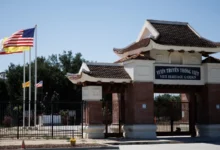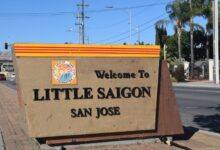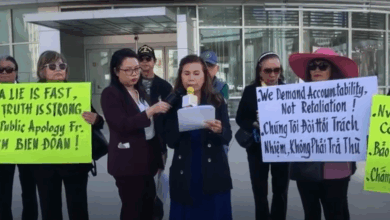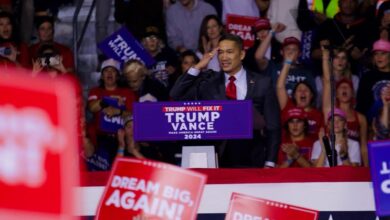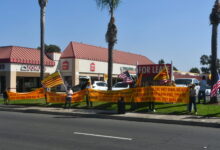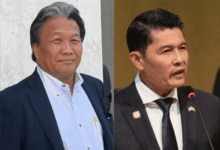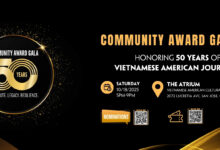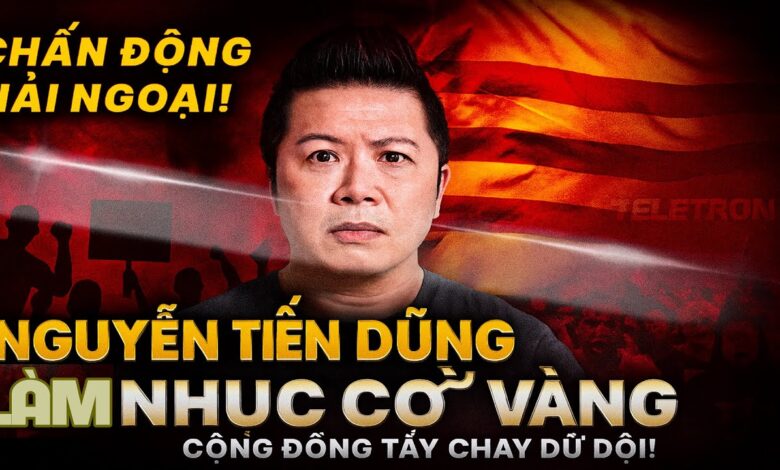
Chuyện xảy ra vào tháng 7/2025 tại một buổi trình diễn do Công ty TELETRON tổ chức, qua màn trình diễn của ca sĩ NGUYỄN TIẾN DŨNG!
Xem video https://www.youtube.com/watch?v=-izOo2Ovo7k
Sau đây là bản lên tiếng của Ủy Ban Thúc Đẩy Xây Dựng Tượng Đài Chiến Sĩ Việt & Mỹ Tại San Jose
Kính gởi:
- Quý tổ chức, hội đoàn, cộng đồng người Việt Quốc Gia tại San Jose,
- Hoa Kỳ và toàn thế giới
- Đến Quý Đồng hương tị nạn cộng sản
Chúng tôi – Những Chiến Hữu, Người Lính trong QLVNCH của Ủy Ban Thúc Đẩy Xây Dựng Tượng Đài Chiến Sĩ Việt & Mỹ Tại San Jose – trân trọng công bố bản lên tiếng này, để cực lực lên án các hành vi sỉ nhục Quốc Kỳ Việt Nam Cộng Hòa, lá cờ thiêng liêng đã thấm máu hàng trăm ngàn chiến sĩ VNCH, của hàng triệu người Việt Nam yêu chuộng tự do.
Trong những tháng gần đây, một chuỗi hành động có tính toán, tổ chức bài bản và mang ý đồ thâm độc, đã nhắm vào cộng đồng người Việt quốc gia tại hải ngoại. Từ sự kiện ca sĩ Nguyễn Tiến Dũng, trong chương trình ca nhạc của công ty Teletron tại Garden Grove, tháng 7 vừa qua – ngang nhiên sử dụng người, mang màu cờ vàng ba sọc đỏ, để làm trò tiêu khiển thô bỉ, phản cảm! Đến việc các du học sinh Việt Nam tại Úc, công khai giẫm đạp, xé! phỉ báng lá cờ ấy trên mạng xã hội – tất cả đều cho thấy một chiến dịch bôi nhọ, xuyên tạc và khiêu khích đang được tiến hành nhằm gây chia rẽ, xúc phạm và triệt tiêu hình ảnh biểu tượng, của cộng đồng người Việt Quốc Gia.
Teletron – với tư cách là đơn vị tổ chức buổi đại nhạc hội trên – phải chịu trách nhiệm về việc dung túng cho tiết mục mang tính lăng mạ biểu tượng quốc gia. Đây không chỉ là một hành vi thiếu đạo đức, mà còn xâm phạm nghiêm trọng đến danh dự, cảm xúc và bản sắc của hàng triệu người Việt tị nạn, những người đã mất quê hương, mất người thân và hy sinh cả đời sống để giữ lấy lá cờ vàng – biểu tượng của tự do, dân chủ và chống độc tài CS.
Chúng tôi đặt câu hỏi:
- Có phải đây là một hành vi vô ý, hay là một kế hoạch cố tình cài cắm của những thế lực thân cộng, nhằm bôi nhọ và hạ thấp cộng đồng người Việt Quốc Gia?
- Công ty Teletron đã “thành đạt” ra sao trong 10 năm qua, và họ có liên hệ gì với những luồng chính trị ngầm từ trong nước?
SỰ THẬT VỀ LÁ CỜ VÀNG BA SỌC ĐỎ
Lá cờ vàng ba sọc đỏ là biểu tượng của Việt Nam Cộng Hòa – một quốc gia từng hiện diện trên bản đồ thế giới, được quốc tế công nhận, có chủ quyền, có Hiến pháp, có thể chế pháp trị và là một thành trì chống cộng sản tại Đông Nam Á trong suốt hơn 20 năm.
- Cờ vàng không phải là “tàn dư!”, mà hình ảnh đã có từ lâu trong lịch sử, lại nữa sau 75, là ký ức lịch sử sống động của hàng triệu người Việt.
- Lá cờ ấy, còn là biểu tượng của chủ quyền quốc gia tại Hoàng Sa – Trường Sa, điều mà cả quốc tế và lịch sử đều không thể chối bỏ.
- Những hành vi phỉ báng cờ vàng, cũng chính là làm tổn hại đến hồ sơ pháp lý đấu tranh chủ quyền lãnh thổ của Việt Nam hôm nay. Mà CS muốn chối bỏ trong âm mưu giữ đảng, bán nước cho Tầu!
CÁC ÂM MƯU PHI DÂN TỘC VÀ THÙ HẬN CỜ VÀNG
Báo cáo của các cơ quan truyền thông quốc tế, như BBC, VOA, RFA đã vạch rõ âm mưu thâm độc này:
- Chính quyền CSVN tiếp tục xem cờ vàng là “thế lực thù địch”, dù đã qua nửa thế kỷ, 50 năm, sau ngày 30/4/1975.
- Giới trẻ trong nước bị nhồi sọ thù hận, phỉ báng di sản VNCH một cách vô tri – như các hình ảnh phỉ báng lá cờ tại bảo tàng quân sự Hà Nội năm 2024.
- Các nghệ sĩ từ trong nước, ra biểu diễn tại hải ngoại, bị tấn công và tẩy chay, nếu “dám” trình diễn đứng gần cờ vàng, về nước đều bị mời lên làm việc! thậm chí khi không hề có liên hệ chính trị gì.
LỜI NHẮN, HÃY NGỪNG NGAY, ĐỪNG ĐỤNG VÀO LÁ CỜ THIÊNG CỦA CHÚNG TÔI!
Chúng tôi không chấp nhận bất kỳ sự thỏa hiệp nào với những hành vi phỉ báng lá cờ Việt Nam Cộng Hòa.
Chúng tôi không khoan nhượng với bất kỳ tổ chức, cá nhân, nghệ sĩ, doanh nghiệp nào, có hành động thiếu tôn trọng với di sản và biểu tượng của cộng đồng người Việt tị nạn.
YÊU CẦU VÀ ĐỀ NGHỊ
- Công ty TELETRON (có chi nhánh tại San Jose) phải chính thức lên tiếng xin lỗi cộng đồng người Việt Quốc Gia, về chương trình xúc phạm Quốc Kỳ VNCH, đồng thời cam kết không tái phạm.
- Các tổ chức, hội đoàn người Việt khắp nơi, cùng tẩy chay các doanh nghiệp, cá nhân có hành vi hoặc cổ súy hành vi, phỉ báng biểu tượng VNCH.
- Yêu cầu các đơn vị truyền thông và các nhà đấu tranh, tiếp tục lên tiếng vạch trần âm mưu thâm độc của cộng sản, trong việc gieo rắc thù hận, chia rẽ cộng đồng.
- Kêu gọi thế hệ trẻ Việt Nam tại hải ngoại và trong nước, hãy tìm hiểu sự thật lịch sử, bên nào yêu nước, bên nào bán nước? vượt lên trên giáo điều tuyên truyền và thù hận, để xây dựng một thể chế mới, tương lai tốt đẹp cho đất nước.
KẾT LUẬN
Lịch sử không thể bị bóp méo. Lá cờ vàng ba sọc đỏ, là một phần không thể xóa nhòa trong ký ức và bản sắc của cộng đồng người Việt Tự Do trên toàn thế giới.
Chúng tôi sẽ không bao giờ im lặng trước bất kỳ hành vi nào, xúc phạm đến biểu tượng thiêng liêng đó – dù đến từ ai, dưới bất kỳ hình thức nào.
Một dân tộc không có ký ức thì không có tương lai.
Chúng tôi, những người con yêu của Việt Nam Cộng Hòa, sẽ giữ vững ngọn cờ chính nghĩa ấy – cho đến khi Việt Nam thật sự có tự do dân chủ. Mãi mãi khẳng định như thế!
Bắc California, ngày 27 tháng 8 năm 2025
Thay mặt Ủy Ban Thúc Đẩy Xây Dựng Tượng Đài Chiến Sĩ Việt & Mỹ Tại San Jose
Người Lính KQ LVH


